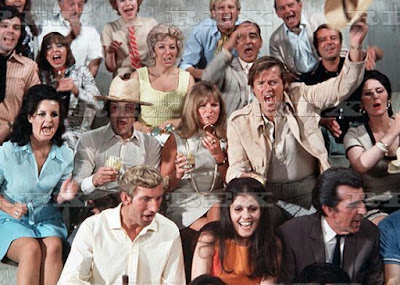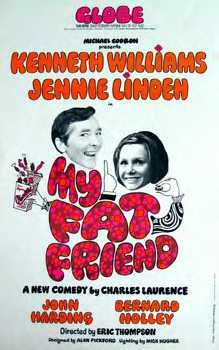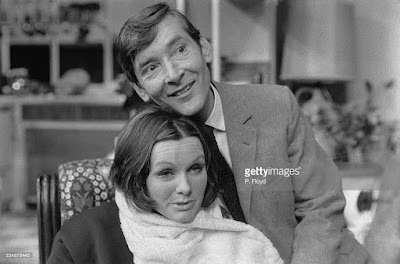Jennie Linden is an actress with a career dating back to the 1960s. Jennie, probably best known for her role in the 1969 film Women in Love, opposite Glenda Jackson, Oliver Reed and Alan Bates, has worked in all areas of the acting profession and has a fund of stories to tell. I caught up with her recently to find out more about her wonderful career and ask her what it was like to share a stage with a certain Mr Kenneth Williams...
First of all, I'd love to know what made you decide to become an actress in the first place?
I became
interested in acting at the age of 4 after watching a Punch and Judy show with
my granny.
As a young actress in the 1960s you appeared in many classic television series of the day - The Saint, The Avengers, The Champions and The Persuaders. Do you have fond memories of working on these shows?
Working in
a TV series as a guest actor was always a joy. After all you not only got to
work with the current stars – Roger Moore, Patrick Macnee, Ian McShane etc, but
also met lots of other actresses and actors and made new friends, working with
new directors.
One of your most famous film appearances was in Ken Russell's adaptation of Women in Love. What are your recollections of that experience?
Ken Russell
was a superb film maker and his work will be recognised eventually, as major. He
was a complex genius, not easy to work with but very stimulating and it was
marvellous to be part of, in my opinion, his most balanced and sensitive film –
Women in Love. His use of colour, each scene reflecting its worth, in
sympathetic colours, was outstanding. It was like a series of paintings and
very much in touch with the senses. You felt his work, rather than listened to
it.
One of your co-stars in that film was Glenda Jackson, who i believe you went on to work with on stage with the RSC in the 1970s. What was Glenda like to work with?
Glenda
Jackson was representative of the “new star”, out with the old. She provided
just what was needed in the 1970s on screen and indeed at the National. She had
the looks and ability and talent to do this. We worked together very well, as
complete opposites, and got on together well, both on stage (Hedda Gabler for
the RSC) and in Women in Love on screen and also in the film Hedda.
You worked with one of my comedy heroes, the late Kenneth Williams, in the stage play My Fat Friend in 1972 and 1973. What are your memories of working with Kenneth?
Memories of
Kenneth are not always printable!! He was a wildly talented, confused, erudite
human being. He was unreliable in the extreme, and often didn’t appear some
nights in the show “My Fat Friend” leaving myself and a 23 year old understudy
to carry the comedy. My, you should have heard the seats bang up! The poor
audience had paid to see Ken and were furious at his absence. He found it very
hard to stay concentrated on Charles Lawrence’s script, he would break off
during the performance and go down to the footlights to chat up to the
audience, much to their delight and my chagrin. Picking up the play again was
like heaving sacks of coal! However I learnt a great deal from Ken and a part
of me was really rather fond of him!
I think you also worked on stage with another of my favourite actresses, Dinah Sheridan. What was she like to work with?
Dinah
Sheridan, a lovely actress. We were together in “Out on the Lawn”, a pre-London
showing of an amusing play, at Watford. Needless to say it didn’t make it into
the West End, even though it starred T.P McKenna! I liked her very much and
also worked with John Gregson in a TV play with Jill Bennett.
As an actor who has a wealth of experience on stage, television and in film, which medium do you prefer and why?
I like all
the mediums, you omitted radio, one of the best by the way! Film was most
interesting to me, you rehearse it, and do it – it’s so clean! On stage you
change it, alter it, rehearse it again, get stale, hate it, get stage fright,
go off it and the run becomes a prison. Three months is the most any actor
should ever do a play. TV is fun, invigorating, fast, challenging to the
extreme. I loved it dearly but perhaps film was my favourite!
How do you think the acting profession has changed since you started out?
The acting
profession lost its structure when Equity opened its doors to the world and its
wife! Anyone can act? No, I don’t think so! Have a look at early films and even
those of 20 years ago, like Sense and Sensibility, ALL the actors know exactly
what they were doing, rehearsals were apparent, discussions were apparent,
between director and artists, nobody let the film down at any point, a
brilliant example of the very high standard I was lucky enough to work with
then, in my generation. In my time the competition was massive, everybody who
was any body could perform to a very high standard. We were trained to do
“comedy”, costume plays, accents, dialects and movement, and to sing. We were
expected to perform as actors and were not cast as the soaps are today. The
part suits the actor because he just has to be himself.
So our
careers had structure, you worked yourself up the ladder, you were only as good
as yesterday, you had to prove your talent every performance. Today it is lazy,
you play a Scottish character because you are a Scot and consequently do no
work on the role. Todays work is based on how well you can mumble and therefore
“appear” to be a really moody performer! Now and again we are given the joy of
a true actor at his/her best and it makes me cry because it is so exciting to
see them excel. Best series – “Call the Midwife” – all the cast can do the job.
Best film series – “The Crown and Mark Rylance in the Hilary Mantel series.
Just a few examples – Michael Kitchen is another one.
The absence
of repertory companies does not help the young. Too much choice for the
director ensues, the newcomer might only get one chance to shine in a TV
production.
Finally, why do you think many comedy actors like Kenneth Williams have maintained such high levels of popularity so many years after they have left us?
Kenneth
Williams was a “one off” – UNIQUE! Very talented, truly talented people in
peoples’ minds. A very special performer is an event and like a musical
composition, remains in people’s memory.
A chap said
to me after viewing Sense and Sensibility by Jane Austen “Of course well you
can’t go wrong with Austen, can you?” I replied, ‘Oh yes you can, very wrong
indeed, unless you are blessed with a talented trained actor. Anyone can act? I
don’t think so! Like all musical instruments, there is only one way to play
them…extremely well!
I
would like to thank Jennie once again for taking the time to answer my
questions so thoughtfully. She provided a fascinating insight both into
working with Kenneth but also the acting profession and how it has
changed over the years.






No comments:
Post a Comment